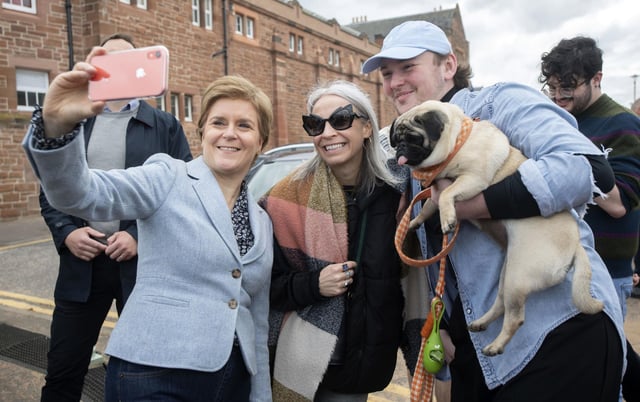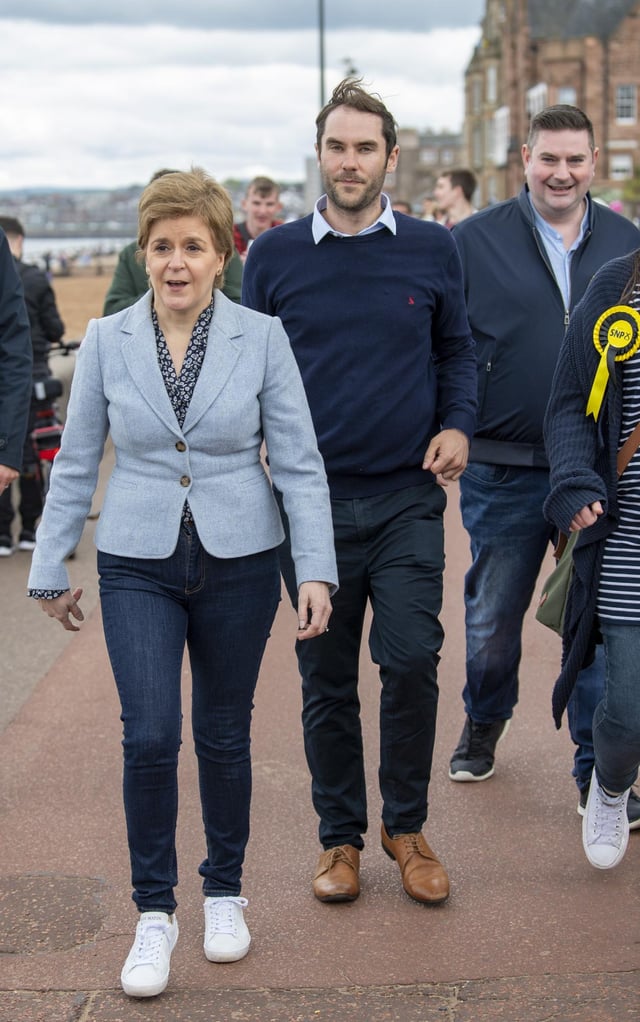The war in Ukraine will not delay a second Scottish independence referendum, First Minister Nicola Sturgeon has vowed.
By Jane Bradley
Monday, 2nd May 2022,
Ms Sturgeon said she had “not changed her position” on when a referendum would be held, despite fears the conflict in Ukraine could continue well into next year. The First Minister has insisted she still sees 2023 as a realistic date for a new vote.
“I’ve not changed my position on the timescale we won the mandate for in the election last year,” she told The Guardian.
Ms Sturgeon also reiterated her party’s stance on Nato membership, saying she would like to see an independent Scotland be a "non-nuclear member” of the alliance. The issue has been divisive in the SNP, which changed its stance in 2012, sparking the resignation of three MSPs.

First Minister of Scotland Nicola Sturgeon (left) poses for selfies during a visit to Portobello, Edinburgh, while on the local election campaign trail.
Picture: Lesley Martin/PA Wire
In Ukraine, president Volodymyr Zelensky said the evacuation of the Azovstal steel plant in Mariupol, where more than 1,000 civilians have been sheltering, had begun. Meanwhile, the head of the military administration in Kharkiv said four districts have been re-captured from the Russians.
Questions have been raised as to how Scotland’s anti-Trident stance will be perceived in a time of conflict with nuclear power Russia.
Ms Sturgeon told Sophy Ridge’s Sky News on Sunday: "I would want to see an independent Scotland be a non-nuclear member of Nato. Remember, the vast majority of countries in the world don't have nuclear weapons and I think we're right now being reminded of the dangers posed by nuclear weapons.”
Ms Sturgeon said Scotland’s “strategically important position” in the North Atlantic would give it strength as part of the alliance.

In Ukraine, president Volodymyr Zelensky said the evacuation of the Azovstal steel plant in Mariupol, where more than 1,000 civilians have been sheltering, had begun. Meanwhile, the head of the military administration in Kharkiv said four districts have been re-captured from the Russians.
Questions have been raised as to how Scotland’s anti-Trident stance will be perceived in a time of conflict with nuclear power Russia.
Ms Sturgeon told Sophy Ridge’s Sky News on Sunday: "I would want to see an independent Scotland be a non-nuclear member of Nato. Remember, the vast majority of countries in the world don't have nuclear weapons and I think we're right now being reminded of the dangers posed by nuclear weapons.”
Ms Sturgeon said Scotland’s “strategically important position” in the North Atlantic would give it strength as part of the alliance.

First Minister Nicola Sturgeon during a visit to Portobello,
Edinburgh, while on the local election campaign trail.
She said: "I would want an independent Scotland to be a constructive and participating member of Nato. And I think one of the big questions for my party – indeed, for those who support an independent Scotland – is to think in this new world order that we're living in, post the Russian invasion of Ukraine, where many of the things we've taken for granted in the post Cold War era have been turned on their head, we need to consider what would an independent Scotland bring to that Nato alliance?
“The question of Nato membership is not always the one that unifies everybody in the SNP, but I think in the world we're living in, it's very important to recognise that would be vital for the security of an independent Scotland and we would have a duty to play our part in that broader security arrangement.”
Nato’s secretary general Jens Stoltenberg has previously said Scotland would have to reapply to join the alliance if it left the UK.

Legal advice on Scottish independence referendum to be released after transparen...
A European Leadership Network paper written last year by John Gower, a rear admiral at the time of the 2014 independence referendum, warned “joining the nuclear alliance Nato on a political non-nuclear platform would be at best exceedingly difficult”.
Ms Sturgeon’s comments came as the UK Green Party said it would seek to move the UK out of Nato in the long term once the conflict in Ukraine was over.
Party co-leader Adrian Ramsay said he did not want to “change structures in the middle of a conflict”, but believed the UK should leave the military alliance in the future.
He said: “We have a long-term policy about reviewing what structures we need to have to build peace in the world and we have to remember this conflict has happened at a time when we are part of Nato, when we are still seeing nuclear weapons dominate.
“Of course we are not about changing structures in the middle of conflict and what we need to do at the moment is focus on how Ukraine can be supported in a wide variety of ways.”
Asked to confirm again the Greens want the UK to leave Nato, Mr Ramsay added: “Yes, that is our long-term policy that we would like to see far greater focus on peacekeeping institutions and institutions that support a reduction in our nuclear weapons and countries moving away from nuclear weapons.”
The UK Government has said plans for new nuclear power stations will not be "imposed" on Scotland.
Boris Johnson’s strategy includes plans to increase nuclear, wind, solar and hydrogen, with eight nuclear reactors – the equivalent of one a year – to be delivered by the end of this decade at existing sites down south.
Ms Sturgeon said last month she believed it would be “realistic” to hold a second independence referendum next year and said “the work is underway”.
Three meetings were held at the end of last year and the beginning of this year to discuss the “approach to the development and delivery” of new independence white papers. Deputy First Minister John Swinney and constitution secretary Angus Robertson also attended the meetings alongside civil servants and advisers.
Ms Sturgeon has also refused to rule out court action after Scotland’s information commissioner ordered her Government to publish its legal advice on whether it would have the requisite powers to hold a second referendum without Westminster’s consent, following a 13-month Freedom of Information battle with The Scotsman.
In a ruling, Scottish Information Commissioner Daren Fitzhenry said the Government’s decisions during the Alex Salmond inquiry and the “obvious” and “significant” public interest around a second independence referendum meant parts of the legal advice should be released.
Ms Sturgeon said: “The Commissioner’s made his ruling, there’s now a June 10 deadline, any government is going to carefully consider all aspects of that and I’m not going to pre-empt that consideration.”
She added: “The question is not whether the Scottish Government will comply with the law. We will. The question is whether political opponents and actually democrats are willing to argue their case democratically and allow the people to decide”.
She said: "I would want an independent Scotland to be a constructive and participating member of Nato. And I think one of the big questions for my party – indeed, for those who support an independent Scotland – is to think in this new world order that we're living in, post the Russian invasion of Ukraine, where many of the things we've taken for granted in the post Cold War era have been turned on their head, we need to consider what would an independent Scotland bring to that Nato alliance?
“The question of Nato membership is not always the one that unifies everybody in the SNP, but I think in the world we're living in, it's very important to recognise that would be vital for the security of an independent Scotland and we would have a duty to play our part in that broader security arrangement.”
Nato’s secretary general Jens Stoltenberg has previously said Scotland would have to reapply to join the alliance if it left the UK.

Legal advice on Scottish independence referendum to be released after transparen...
A European Leadership Network paper written last year by John Gower, a rear admiral at the time of the 2014 independence referendum, warned “joining the nuclear alliance Nato on a political non-nuclear platform would be at best exceedingly difficult”.
Ms Sturgeon’s comments came as the UK Green Party said it would seek to move the UK out of Nato in the long term once the conflict in Ukraine was over.
Party co-leader Adrian Ramsay said he did not want to “change structures in the middle of a conflict”, but believed the UK should leave the military alliance in the future.
He said: “We have a long-term policy about reviewing what structures we need to have to build peace in the world and we have to remember this conflict has happened at a time when we are part of Nato, when we are still seeing nuclear weapons dominate.
“Of course we are not about changing structures in the middle of conflict and what we need to do at the moment is focus on how Ukraine can be supported in a wide variety of ways.”
Asked to confirm again the Greens want the UK to leave Nato, Mr Ramsay added: “Yes, that is our long-term policy that we would like to see far greater focus on peacekeeping institutions and institutions that support a reduction in our nuclear weapons and countries moving away from nuclear weapons.”
The UK Government has said plans for new nuclear power stations will not be "imposed" on Scotland.
Boris Johnson’s strategy includes plans to increase nuclear, wind, solar and hydrogen, with eight nuclear reactors – the equivalent of one a year – to be delivered by the end of this decade at existing sites down south.
Ms Sturgeon said last month she believed it would be “realistic” to hold a second independence referendum next year and said “the work is underway”.
Three meetings were held at the end of last year and the beginning of this year to discuss the “approach to the development and delivery” of new independence white papers. Deputy First Minister John Swinney and constitution secretary Angus Robertson also attended the meetings alongside civil servants and advisers.
Ms Sturgeon has also refused to rule out court action after Scotland’s information commissioner ordered her Government to publish its legal advice on whether it would have the requisite powers to hold a second referendum without Westminster’s consent, following a 13-month Freedom of Information battle with The Scotsman.
In a ruling, Scottish Information Commissioner Daren Fitzhenry said the Government’s decisions during the Alex Salmond inquiry and the “obvious” and “significant” public interest around a second independence referendum meant parts of the legal advice should be released.
Ms Sturgeon said: “The Commissioner’s made his ruling, there’s now a June 10 deadline, any government is going to carefully consider all aspects of that and I’m not going to pre-empt that consideration.”
She added: “The question is not whether the Scottish Government will comply with the law. We will. The question is whether political opponents and actually democrats are willing to argue their case democratically and allow the people to decide”.
No comments:
Post a Comment